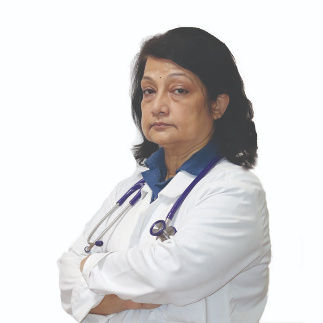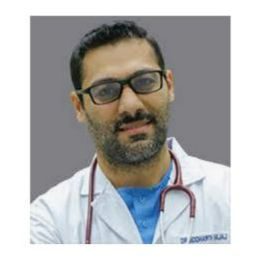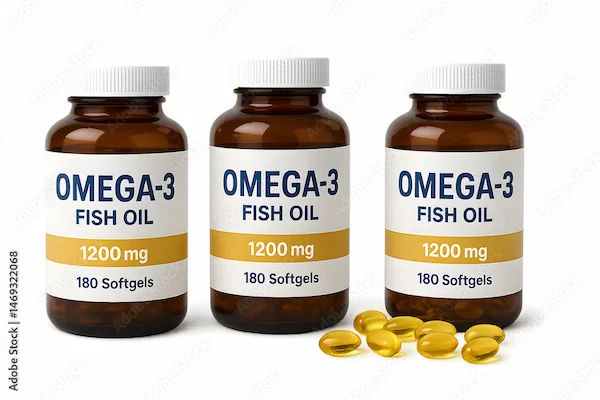Can Hypertension Be Reversed or Cured: Understanding the Possibilities
Hypertension, commonly known as high blood pressure, can often be managed effectively with lifestyle changes, such as a healthy diet, regular exercise, stress reduction, and avoiding smoking and excessive alcohol. While there is no permanent "cure," these interventions, combined with proper medical care, can significantly improve blood pressure levels and reduce the risks of complications.

Written by Dr Sonia Bhatt
Last updated on 3rd Jul, 2025
Hypertension, commonly known as high blood pressure, is a widespread condition that affects the arteries in the body. It occurs when the force of blood against the artery walls remains consistently high, causing the heart to work hard to circulate blood. Typically, hypertension is diagnosed when blood pressure readings consistently reach 130/80 mm Hg or higher. If left unmanaged, high blood pressure can lead to severe health complications such as strokes, heart attacks, and other critical conditions. Continue reading to explore the symptoms, causes, and treatment options for hypertension.
When is High Blood Pressure Classified as Hypertension?
Blood pressure is classified into four primary categories:
Normal Blood Pressure: Readings below 120/80 mm Hg.
Elevated Blood Pressure: The systolic pressure (top number) ranges between 120 and 129 mm Hg, while the diastolic pressure (bottom number) remains below 80 mm Hg.
Stage 1 Hypertension: Systolic pressure ranges from 130 to 139 mm Hg or diastolic pressure falls between 80 and 89 mm Hg.
Stage 2 Hypertension: Systolic pressure reaches 140 mm Hg or higher, or diastolic pressure is 90 mm Hg or more.
Blood pressure readings exceeding 180/120 mm Hg indicate a hypertensive crisis, requiring immediate medical attention.
Symptoms of Hypertension
Hypertension is often referred to as a "silent condition" because most individuals do not experience noticeable symptoms. However, when blood pressure reaches dangerously high levels, typically 180/120 mm Hg or above, symptoms may arise. These can include:
Chest discomfort
Intense headaches
Dizziness
Nausea or vomiting
Shortness of breath
Blurred or altered vision
Ringing or buzzing in the ears
Feelings of anxiety or confusion
Irregular heart rhythms
Nosebleeds
Get Your Hypertension Symptoms Checked
Causes of Hypertension
Hypertension is generally classified into two types:
Primary Hypertension
This is the most common form of high blood pressure and develops gradually over time without a single identifiable cause. Instead, it typically arises from a combination of factors such as:
Leading a sedentary lifestyle
Consuming a diet high in sodium and unhealthy foods
Excessive alcohol consumption
Secondary Hypertension
This type occurs due to an underlying health condition or the use of certain medications. It tends to appear suddenly and often results in higher blood pressure levels than primary hypertension. Contributing factors include:
Congenital blood vessel or heart defects
Tumors of the adrenal gland
Certain medications, including pain relievers, decongestants, birth control pills, and other prescription drugs
Use of illegal substances like amphetamines and cocaine
Chronic kidney disease
Disorders of the thyroid gland
Obstructive sleep apnea
In some cases, primary and secondary hypertension may coexist. For instance, the emergence of a secondary condition can worsen pre-existing high blood pressure.
Is Hypertension Curable?
Hypertension cannot be cured or reversed, but it is manageable. Your healthcare provider can design a personalised treatment plan tailored to your specific needs, based on your test results and physical examination. Typically, a combination of lifestyle modifications and prescribed medications can effectively control high blood pressure and reduce its associated risks.
Hypertension Treatment
Treatment for high blood pressure typically involves a combination of lifestyle modifications and medications. Healthcare providers determine the appropriate approach based on the underlying causes, your blood pressure levels, and any existing health conditions.
Lifestyle Changes for Managing Hypertension
Here are some effective strategies to naturally lower your blood pressure:
Maintain a Healthy Weight: Consult your healthcare provider to determine a weight range that’s suitable for you.
Follow a Balanced Diet: Adopt eating habits like the DASH diet, which emphasises vegetables, whole grains, fruits, and low-fat dairy products.
Boost Potassium Intake: Include potassium-rich foods such as avocados, bananas, and potatoes (with skin) in your meals. Aim for 3,500 to 5,000 milligrams per day through food sources.
Reduce Sodium Intake: Aim to keep your daily salt consumption below 1,500 milligrams. If that seems challenging, start by lowering your current intake by at least 1,000 milligrams.
Moderate Alcohol Consumption: If you drink alcohol, do so sparingly and within recommended limits.
Engage in Regular Exercise: Begin with light activities and gradually increase to 150 minutes of aerobic exercise weekly. Resistance training, such as using light weights, can also be beneficial.
Medications for Managing Hypertension
There are four main types of blood pressure medications that are commonly prescribed as the first-line treatment:
Angiotensin-converting Enzyme (ACE) Inhibitors: These medications block the production of angiotensin II, a hormone that causes blood vessels to constrict. By preventing this hormone from forming, ACE inhibitors help keep blood vessels relaxed and open.
Angiotensin II Receptor Blockers (ARBs): Similar to ACE inhibitors, ARBs block the binding of angiotensin II to its receptors in blood vessels, preventing narrowing of the vessels and helping to lower blood pressure.
Calcium Channel Blockers: These medications stop calcium from entering the muscle cells of your heart and blood vessels, which helps relax the blood vessels and reduce blood pressure.
Diuretics (Water Pills): Diuretics help remove excess sodium and fluids from the body, which reduces the volume of blood, ultimately lowering blood pressure. They are often used in combination with other medications for better effectiveness.
In some cases, healthcare providers may recommend combining these medications to provide optimal blood pressure control.
Hypertension Prevention
There are both modifiable and non-modifiable risk factors that can increase your likelihood of developing hypertension. Non-modifiable factors, such as age over 65, a family history of high blood pressure, and conditions like kidney disease or diabetes, cannot be changed. However, managing modifiable risk factors is key to preventing hypertension and associated complications affecting the heart, kidneys, brain, and other organs. Avoiding these risk factors becomes even more critical for those with non-modifiable or hereditary risks. Here are some steps you can take to lower your chances of developing hypertension:
Eat more fruits and vegetables.
Limit sitting time.
Engage in physical activity, including walking, swimming, dancing, running, or strength-building exercises like weightlifting.
Aim for at least 150 minutes of moderate-intensity aerobic exercise or 75 minutes of vigorous activity per week.
Include strength training exercises two or more days a week.
Lose weight if you are overweight or obese.
Take medications as prescribed by your healthcare provider.
Keep regular appointments with your doctor.
Don’t consume excessive salty foods (aim for less than 2 grams per day).
Avoid eating foods high in saturated or trans fats.
Restrict alcohol consumption to 1 drink per day for women and 2 for men.
Don’t skip or share medications
Quit smoking or using tobacco.
Conclusion
Hypertension, though not curable, is a highly manageable condition that requires consistent effort to control. By adopting healthy lifestyle changes, including a balanced diet, regular exercise, weight management, and reduced sodium intake, individuals can significantly lower their blood pressure and reduce the risks associated with this condition. Medications also play a crucial role in managing hypertension, with healthcare providers often recommending a combination of treatments tailored to individual needs. Prevention is key, particularly for those with modifiable risk factors, and maintaining regular check-ups with healthcare professionals ensures early detection and effective management. Ultimately, while hypertension may not be reversed, it is possible to live a healthy life with proper care and treatment.
Consult Top Cardiologists
Consult Top Cardiologists

Dr. Dayanashre N
General Physician
3 Years • MBBS
Bengaluru
PRESTIGE SHANTHINIKETAN - SOCIETY CLINIC, Bengaluru

Dr. Bhethala Sharan Prakash
General Physician/ Internal Medicine Specialist
5 Years • MBBS MD
Bengaluru
PRESTIGE SHANTHINIKETAN - SOCIETY CLINIC, Bengaluru

Dr. Anand Ravi
General Physician
2 Years • MBBS
Bengaluru
PRESTIGE SHANTHINIKETAN - SOCIETY CLINIC, Bengaluru

Dr. Tripti Deb
Cardiologist
40 Years • MBBS, MD, DM, FACC, FESC
Hyderabad
Apollo Hospitals Jubilee Hills, Hyderabad

Dr. Siddharth Bajaj
Cardiologist
10 Years • MBBS, M.D. D.M. (Cardiology)
Hyderabad
Apollo Hospitals Jubilee Hills, Hyderabad
Get Your Hypertension Symptoms Checked

Dr. Dayanashre N
General Physician
3 Years • MBBS
Bengaluru
PRESTIGE SHANTHINIKETAN - SOCIETY CLINIC, Bengaluru

Dr. Bhethala Sharan Prakash
General Physician/ Internal Medicine Specialist
5 Years • MBBS MD
Bengaluru
PRESTIGE SHANTHINIKETAN - SOCIETY CLINIC, Bengaluru

Dr. Anand Ravi
General Physician
2 Years • MBBS
Bengaluru
PRESTIGE SHANTHINIKETAN - SOCIETY CLINIC, Bengaluru

Dr. Tripti Deb
Cardiologist
40 Years • MBBS, MD, DM, FACC, FESC
Hyderabad
Apollo Hospitals Jubilee Hills, Hyderabad

Dr. Siddharth Bajaj
Cardiologist
10 Years • MBBS, M.D. D.M. (Cardiology)
Hyderabad
Apollo Hospitals Jubilee Hills, Hyderabad

